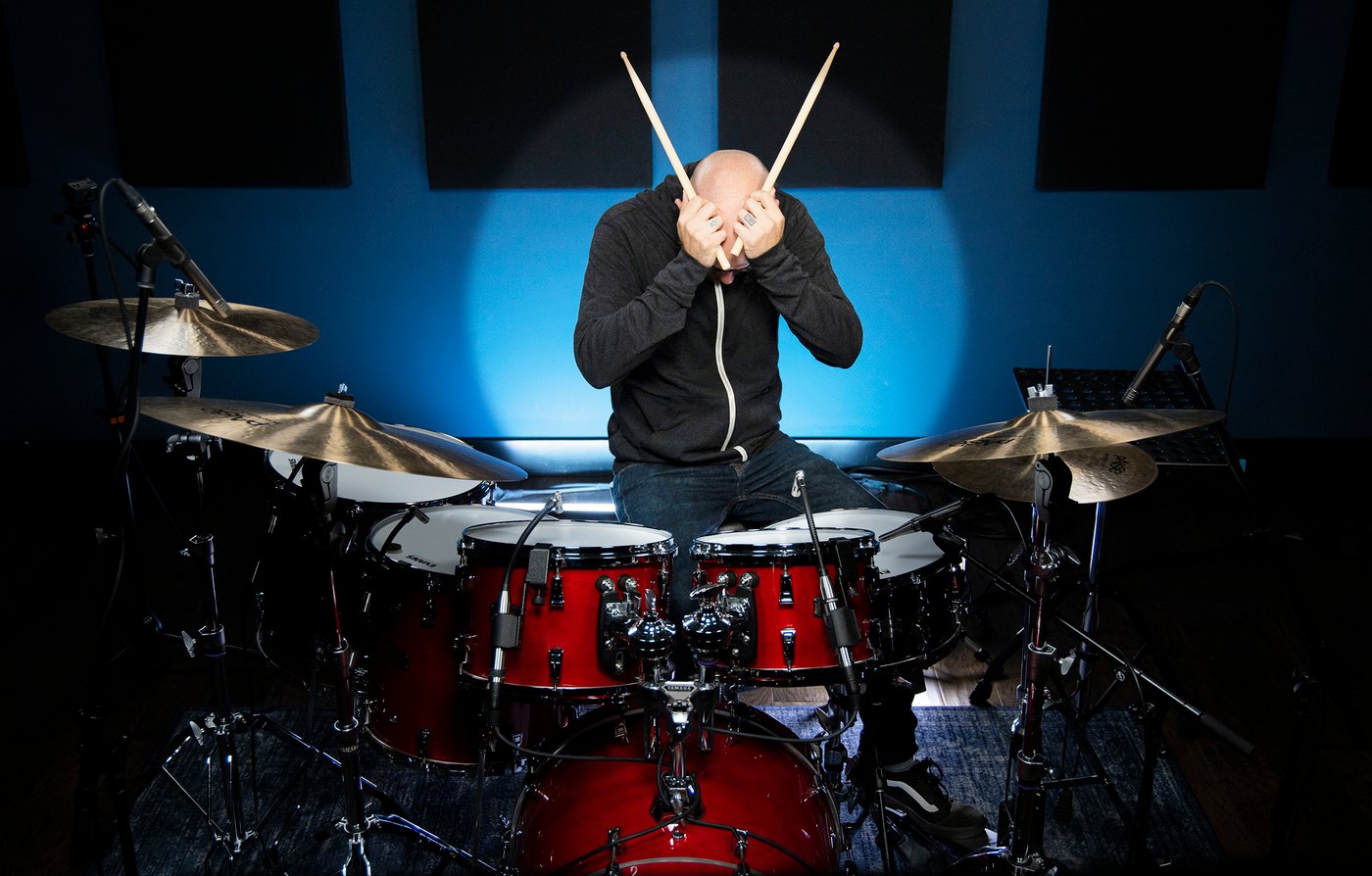
While pro musicians might seem confident, it’s actually common for even the biggest superstars to get the pre-show jitters. Eddie Van Halen, Ozzy Osbourne, Adele, Harry Styles, and many others have had to face their stage fright to pursue their passion.
Now that you know you’re in good company, here are some tips to help you overcome stage fright.
Like most anxieties, stage fright happens when your brain and body think you’re in danger when you’re not.
The human body has evolved to react to potential threats. However, even without an actual threat, your body may still respond with a fight-or-flight or freeze response when you’re scared. This can hinder your ability to perform in various situations, including on stage.
The first step is to forgive yourself. It’s not your fault, and you’re not alone.
There are ways to lessen your performance anxiety, and much of this has to do with preparation, relaxation, and distraction.

Here are some tips to help you overcome stage fright before gig day:
1. Set a time limit for feeling nervous
It’s natural to feel anxious before performing, but try not to sit around with your thoughts and dwell on it. Instead, set a time limit for “feeling nervous” and then distract yourself by doing something else, like making a smoothie or doing warm-up exercises.
2. Picture the perfect performance
Close your eyes and picture yourself performing perfectly in front of the audience. Positive visualization can help calm your nerves and boost your confidence.
3. Get some exercise
Exercise is a great way to manage anxiety and release endorphins. Go for a run or practice your instrument. The gym is an option, too!
4. Watch or listen to something that makes you happy
Laughter is the best medicine, and it can also help counteract feelings of anxiety. Watch a funny video or listen to your favorite music to boost your mood and help you relax.
5. Stay hydrated
Drink plenty of water the day before the performance to keep your body hydrated and your joints lubricated. Mild dehydration can also increase anxiety.
6. Get a good night’s sleep
Make sure you get enough sleep the night before the performance. Being well rested can help you feel more relaxed and focused.

Here are some tips to manage stage fright on the day of your performance:
1. Discharge excess adrenaline to calm down
If you’re feeling anxious, use the adrenaline in your body to your advantage. Jump up and down, shake your limbs, or jog in place. Any movement can help you feel calmer.
2. Control your breathing
When you’re in fight-or-flight mode, your breathing tends to become faster. To calm yourself down, practice breathing slowly and deeply. Breathe in and out through pursed lips. Create a rhythm where your exhale lasts twice as long as your inhale, which can naturally sooth your nervous system.
3. Avoid stimulants (like caffeine)
Your body floods with adrenaline before a performance, so avoid further stimulation. Too much caffeine can also increase anxiety, so choose herbal tea instead of coffee.
4. Smile to feel better
Smiling can make you feel happier and calmer, even if you don’t feel like it. Force your face to smile, crinkle your eyes, and puff out your cheeks. Your brain will respond to the physical act of smiling, making you feel happier.
5. Show confidence in yourself
Don’t talk to everyone about how nervous you are. It will only make you and others more anxious. Instead, tell yourself and your bandmates that everything is excellent, you will all perform well, and the audience will love the show. Eventually you might start to believe it.
6. Dive right in
Focus on your instrument and pretend you’re at band practice. No one knows the part as well as you, and the crowd has no idea what you’re thinking or how you feel.
We tend to care too much about what people think of us. You’ve practiced the song off stage; you can play it on stage, too.
A solid practice routine can help reduce stage fright
Practicing is the only thing that will help you improve or keep up with your musical chops. The more you practice and internalize what you play, the better you become, which will help you feel better.
Even if you only have a few minutes a day to squeeze in practice, it’s better than nothing! Practicing with a mirror and recording yourself can also help you determine potential weaknesses.
The more you actively and purposefully practice, the better you become and the more confident you’ll feel about showcasing your chops to the world.
Share your videos on social media and ask other musicians for their honest feedback. Don’t be scared to be intentional and vulnerable; it’ll help you get better and gain confidence.
A pre-performance routine can help you get into the right mindset before going on stage. This routine could include warm-up exercises, positive self-talk, or even a song that makes you feel good.

Stage fright is a common experience among performers, and its triggers can vary from person to person. Even pros may still feel nervousness and physical symptoms on stage. What are the factors that can cause this type of anxiety?
By understanding the reasons behind stage fright, it becomes easier to manage it. Here are some potential triggers:
Fear of judgment: Many performers fear being judged by the audience or receiving negative feedback, which can lead to self-doubt and anxiety.
Lack of confidence: Someone who lacks confidence in their abilities may feel insecure about their performance and worry about making mistakes.
Past negative experiences: If a performer has had a negative experience on stage in the past, like forgetting a part or receiving negative feedback, it can contribute to feelings of anxiety in future performances.
Pressure to perform: High-stakes performances or the expectation to deliver a flawless performance can put undue pressure on a performer and lead to feelings of anxiety.
Physical symptoms: The physical symptoms of stage fright (like sweating, trembling, or a racing heart) can become a self-fulfilling prophecy and cause a performer to become even more anxious.
Lack of preparation: A performer who has not adequately prepared for their performance may feel uncertain and worry about making mistakes.
Perceived audience expectations: If a performer feels that the audience has high expectations of them, it can increase feelings of pressure and anxiety.
Research shows that genetic factors can significantly impact the development of anxiety disorders. While there’s limited research on the origins of stage fright, up to 30% of cases of generalized anxiety disorder may be hereditary (which means anxiety can run in the family).
Funnily enough, several studies indicate that people who report feeling anxious before giving a speech or taking a test often perform better than those who experience no stress. The takeaway is to recognize anxiety as a constructive and expected response. But it’s important to not fixate on these feelings.
The physical reactions to stage fright can trigger intense anxiety. Your body goes into fight or flight mode, causing symptoms that can interfere with your performance. Common symptoms include a pounding heart, shallow breathing, a dry mouth, trembling, sweating, and feeling faint or dizzy.
These physical symptoms can be distressing and distracting, making it difficult to focus on your performance:
Stage fright is more common than you think. While it can be overwhelming and even debilitating at times, remember that it’s a natural part of the performance process.
With practice, preparation, and a positive attitude, you can overcome stage fright and deliver a memorable performance. Remember to take deep breaths, focus on your performance, and enjoy the experience. You’ve got this!
Evan Chapman is a drummer and writer with over 20 years of playing experience. He offers tips and creativity tricks to beginner and intermediate drummers at attunedmusician.com.


By signing up you’ll also receive our ongoing free lessons and special offers. Don’t worry, we value your privacy and you can unsubscribe at any time.
We use cookies for traffic data and advertising. Cookie Policy »